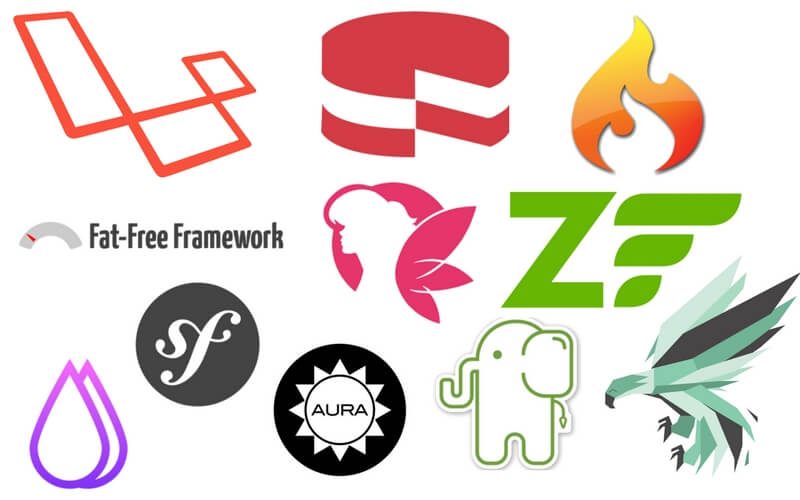
PHP is the most commonly used server-side scripting language used for web developers worldwide. To date, its popularity remained unchallenged as we have seen a huge proliferation of PHP-based frameworks with varying degrees of capabilities and functional elements.
These PHP frameworks took the popularity of PHP to the next level with their specific attributes serving different web needs in different ways.
With so many great frameworks being used in PHP development for the web continuing to add value to the user experience. It would be wise to know the frameworks that will enjoy more popularity in 2018.
Table of Contents
By taking insights from Google Trends we from Metizsoft Solutions have undertaken the task of choosing 11 of the top frameworks that web developers are likely to find most useful in 2018.
Top 11 PHP Frameworks
Any Custom PHP application development company knows the importance of the Laravel PHP Framework.
This is the framework that is used for rapid application building with the MVC architecture.
The popularity of Laravel can also be attributed to the tremendous scope of customization and a robust community of developers worldwide.
This framework comes with a whole range of modern web development attributes and features including a very lightweight Blade templating engine, a packaging system, unit testing, ORM, RESTful controllers, etc.
It is also the first of its kind framework to offer a route with abstraction.
Phalcon PHP Framework is another popular MVC-based PHP framework that gained tremendous popularity in recent years thanks to its lighting fast development speed.
Another major commendable thing about this framework is it uses too few resources when compared to other PHP frameworks.
Phalcon as a framework is also known for offering several data storage tools to the programmers like its own SQL dialect.
The most commendable features of this framework other than this include template engines, exceptional ease of building apps, international language support, and many other features.
Phalcon is a great framework for performance-driven fully operational web apps and high-performance REST APIs.
Codeigniter is preferred by most developers for fast-paced app development.
It is extremely lightweight, precise, and very direct with a no-nonsense approach.
The small footprint and absence of any specific software or command line make it a great framework for quicker development.
All you need is to upload the files and you can start from there.
This framework is also known for its negligible learning curve and the rich set of libraries.
It comes with extensive documentation, help from a vast global community of developers, and also some remarkable academic patronage like the committed effort of The British Columbia Institute of Technology to ensure its continued growth and development.
Symfony is a PHP framework regarded widely as a stable, performance-driven, well-documented, and modular framework.
Symfony gets its patronage and backing from the French SensioLabs and its community is continuously playing important roles to add value to the framework.
Symfony framework is deployed and actively used by several big names in media companies and global conglomerates including the BBC and various open-source projects like Drupal and publish.
Symfony is known for its unmatched stability and extensive documentation.
CakePHP framework thanks to its exceptionally simple coding approach and a lower learning curve is the best framework for starters when they venture into building fast-paced professional apps.
To ensure optimum development speed it offers code generation and scaffolding functions.
The uniqueness of CakePHP consists of mainly its detailed guide for the developers in spite of following MVC protocols.
CakePHP boasts very succinct documentation and an array of portals for active support.
The Cake Development Corporation also offers premium support for its developers.
- Zend Framework
Zend is a highly professional PHP Framework used widely for building performance-optimized enterprise-grade apps that offer great security features, high-end performance, and unmatched extensibility.
It is particularly built for enterprise-grade apps and this allows it to flaunt a whole array of modern web app components including feeds, forms, authentication, internationalization, services, and more.
As it is scrupulously built for enterprise apps, Zend is not used for rapid app development.
Fuel is a new and recent PHP framework known already worldwide for sophistication, up-to-date feature support, high extensibility and modularity, and support for HMVC architecture.
It is an extremely lightweight framework known for powerful ORM support, enhanced security features, and a complete authentication framework built within.
Slim is a truly stripped-off, minimalistic small framework that took its inspiration from Ruby Sinatra. It is the ultimate framework used for building lightweight RESTful APIs and an array of standard and additional features.
It comes with detailed documentation to help beginners and offers a very low learning curve.
- Phpixie
Phpixie comes as a surprise new PHP framework that is very lightweight, modular, and extremely easy to learn and maneuver for web app development tasks.
It is particularly popular for boasting an array of tools that can make the security and privacy of apps better.
It offers support for MongoDB and the sharing of codes. The community of the framework isn’t robust yet and it still has to come with more modules.
Fat-Free is another micro PHP Framework that can be used for building fully-fledged web apps with all standard features.
The rich set of features and capabilities makes it positioned often in between a bigger framework like Laravel and other smaller microframeworks.
Fat-Free, as the name suggests, is stripped off to the basics but comes fully loaded with packages for different functionalities like CSS compression, data validation, Open ID, unit testing, image processing, etc.
- Aura
Aura is another micro framework that can basically be described as just a set of decoupled PHP libraries with the distinction of being maintained on a regular basis.
Each library of Aura is completely self-contained, and dependency-free and therefore can be separately integrated into any development project.
This flexible set of libraries with detailed documentation for each of them makes Aura so special a framework.
Read More:
AboutChetan Sheladiya
Related Posts
An Extended Guide on How to Hire Full Stack Web Developer in 2022!
The urge to recruit a Full Stack Web Developer amongst business owners and entrepreneurs has grown immensely in the past...
Why Migrate from AngularJS to Angular? How will it help you?
Do you want to migrate from AngularJS to Angular? We will take you through the benefits of migrating to AngularJS to help you...



